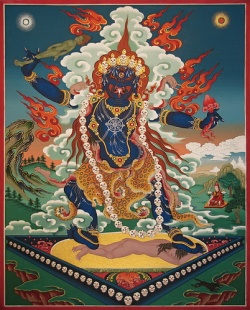Integrating Buddhism and Western Psychotherapy: The Abhidharma — Buddhist Philosophy and Psychology
I am using the term Abhidharma here as a way to study the self anddrop our identification with the self, in order to live a happier, healthier and more joyful life. I see this as a foundation for a new psychotherapy embracing both Eastern and Western Philosophy and Psychology.
The Abhidharma is the known as the Higher Teaching of the Buddha, what I would refer to as the teaching of the Apex. One definition of Dharma is all manifestations of Reality (Buddha); Abhi, or Higher, is what I have termed the Apex of all Dharmas. So when we express it using the image of a triangle, all selves are Dharma, which is one side of thetriangle, and beyond self, or Buddha is the other side of the triangle.Abhi is the Apex which is an ever-changing, unfixed process that includes and embraces all selves as perfect, complete and whole. It goesbeyond their individuality or separateness, and is not attached to any particular self, or to non-attachment either.
The traditional Abhidharma teachings constitute what can be considered Buddhist psychotherapy. One of the big differences between Buddhist psychotherapy and most western psychotherapy is their starting point. In Buddha’s understanding, which came directly out of his enlightenment, all sentient beings are complete, whole and perfect as they are, just as every tree, plant or animal is perfect as it is. We don’t normally look at a tree or a dog and say that it is imperfect; yetour discriminating mind tells us we or others are not perfect as we are. Within perfection there is always imperfection and within imperfection there is already perfection. By contrast, since its beginnings western psychotherapy has been founded on the notion of reaching wellness or wholeness, coming from a place where we are not already well and whole but lacking something.
In the Abhidharma based on Buddha’s enlightenment each of us consistsof 10,000 states of mind or aspects of self. Each aspect or self is perfect, complete and whole as it is, when it is awake and conscious andempowered, owned and embodied. Each has a voice and a function, and each and every self has a right to be and is here to bring the total or gestalt to fulfillment and true joy, liberation and happiness. When an aspect, or voice, is not owned and appreciated, it acts out in immature and harmful ways; when owned and empowered it will reach maturity and transcend itself, meaning it will actually go beyond itself and be healthy and appropriate.
Every one of these aspects or selves wants to be heard and listened to by the the Apex or “me.” True psychological health and well-being comes from seeing all these aspects of self, including no-self, as a well-functioning system, like a company that knows and appreciates all its employees and produces the finest product. The CEO of the company, whom I refer to as the Apex or me, takes care of its employees by truly listening to each and every one of them, empowering each to serve its highest purpose.
This process of empowerment begins with simply asking each one to speak and clarify what its job is. We ask each voice to speak first as disowned and not yet known or appreciated. Every voice wants to be heard, recognized, loved and appreciated. When it isn’t, it acts out in covert and hostile ways that undermine the whole system. When it’s held down in the basement unheard, without food or water, not to mention a TV, computer, BlackBerry or iphone, it will function unhealthily, pathologically, or at least immaturely. It damages itself and others. Under extreme circumstances it can even come out in such negative and harmful ways as addictions and narcissism. These same voices when owned and given an opportunity to speak, to be embodied and empowered, will transcend themselves and function in positive, healthy and mature ways.
When a voice is asked to imagine what it would be like to be owned, honored and appreciated it begins to see its potential to serve the whole system and come to maturity and psychological well-being. Then when the disowned voice is owned, embodied and empowered the whole system realizes its fullest potential and capacity. This allows each aspect or self to move from a negative to a positive functioning, to health and appreciation of all life, its own as well as others’.
The next stage after including and embodying is to detach and dis-identify from every aspect and to gain freedom from each state of mind. Detaching and not being identified with is very different from disowning in that it appreciates each voice as pure, perfect, and whole and yet is no longer attached to, or run by any particular voice.
When all selves are seen as intrinsically perfect, complete and whole, they are appreciated as awakened and therefore Buddha. The Buddhasaid that all sentient beings have the same virtue and wisdom as the Buddha. This means that all aspects of mind, or voices, are Dharma and therefore Buddha. There is no Dharma apart from Buddha and no Buddha apart from Dharma. All Buddhas are Dharma and all Dharmas are Buddha. All sentient beings are Buddha and all Buddhas are sentient beings, and every aspect of the whole, since it is a Dharma manifesting as Buddha, is a perfect manifestation of wisdom and compassion, is Buddha/Dharma..
One essential difference between Abhidharma psychotherapy and westernpsychotherapy is that in Abhidharma the notion of self is seen as just that: a notion, a concept, not solid, substantial or fixed. In the Buddha Dharma this is called sunyata (emptiness). “No-self,” or the transcendent, is appreciated as well as “self.” “No-mind” is appreciated as well as “mind.”
In Abhidharma the dropping of the self is an indispensable part of the process of self-realization. In order to drop the self we must firstknow the self. This is where the depth of the Big Mind practice allows us to truly know the self intimately before we are able to drop the self. How can we let go of that which is not known? Without appreciatingthe dropping off of the self we cannot really appreciate the Apex in its totality. There are two sides to a human being: the human and the being, and to be a well-functioning human being it is necessary to acknowledge, embrace and transcend both sides as the Apex. The human hasall the potential to feel, to have emotions like fear, and to be damaged. The being side just is, there is an absence of emotions, fear or damage.
There is a personal and an impersonal side to every human being. There is a relative as well as an absolute side to this one reality, a fullness as well as an emptiness as complete human beings.
When each voice or self is embodied and transcended it comes to the Apex. This is what I am calling “Zen Abhidharma,” integrating the teachings of my own Zen Master Maezumi Roshi and those I’ve received from psychotherapists Drs. Hal and Sidra Stone, bridging western psychotherapy and eastern Buddha Dharma for our psychological health as human beings in the 21st Century.


